- Home
- Rosamunde Pilcher
The Carousel Page 5
The Carousel Read online
Page 5
I began to laugh. I suddenly thought of Phoebe saying, when you settle down with a man, it is absolutely vital that he makes you laugh. Nigel, it was true, had never made me laugh much. On the other hand, he was a wizard with cars, and spent a good deal of his spare time either with his head under the hood of his M.G., or else prone beneath it, with only his feet sticking out, and conversation reduced to requests for a larger monkey wrench.
I said, comfortingly, “You can’t be good at everything. If you’re a successful artist, it would be too much to ask to be a mechanic as well.”
“That’s what’s so fantastic about Phoebe. She paints like a dream. She could have made a really great name for herself if she hadn’t happily subjugated her talent in creating a home for Chips … and for all the stray students like myself who lived with them and worked with them and learned so much from them. Holly Cottage was a sort of refuge for so many young and struggling artists. There were always immense, delicious meals, and order and cleanliness and warmth. You never forget that sort of security and comfort. It instills in you a standard of good living—and I mean ‘good’ in the true sense of the word—for the rest of your life.”
It was marvellously satisfying to hear another person state aloud what I had always felt myself about Phoebe, and yet, somehow, had never been able to express.
I said, “We’re the same, you and I. When I was a child, it was just about the only time I ever cried, when I had to say good-bye to Phoebe, and get on the train and go back to London. And yet once I was home again, back with my mother, and with my own room, and all my own things around me, it was all right. And by the next day, I was always quite happy again, and involved, and glued to the telephone, ringing up all my friends.”
“The tears would have been the direct result of the insecurity of two different worlds touching. Nothing makes one more miserable.”
I thought about this. It made sense. I said, “I suppose so.”
“Actually, I can’t imagine you being anything but a happy little girl.”
“Yes, I was happy. My parents were divorced, but they were both wise and intelligent people. And it all happened when I was very little, so that it didn’t leave what you might call a lasting scar.”
“You were lucky.”
“Yes, I was. I was always loved and I was always wanted. You can’t ask more than that out of any childhood.”
Now the road sloped and curved towards Porthkerris. Through the murk, the lights of the harbour sparkled far below us. We came to the gates of the Castle Hotel, and turned in, and made our way up the winding drive, the avenue of oak trees. There was an open space, with tennis courts and putting greens, and then a wide gravel sweep in front of the hotel. Lights shone from windows and the glassed revolving door. I drew up between a Porsche and a Jaguar, pulled on the brake and turned off the engine.
“I can’t help feeling very slightly out of place. Do you know, I’ve never been here before. Nobody’s ever been rich enough to bring me.”
“Come in and I’ll buy you a drink.”
“I’m not suitably dressed.”
“Neither am I.” He opened the door. “Come on.”
We left the car, looking dusty and forlorn between its aristocratic neighbors, and Daniel led the way through the revolving doors, and inside it was tremendously warm and thickly carpeted and expensive-smelling. It was that slack period between tea and cocktail time, and there were not many people about; only a man in golf clothes, reading the Financial Times, and an elderly couple watching television.
The hall porter gave us a cold glance, then recognised Daniel and hastily rearranged his expression.
“Good evening, sir.”
“Good evening,” said Daniel and headed straight in the direction of the bar. But it was my first visit to the Castle, and I wanted to linger and inspect. Here was a writing room, and here, visible through open double doors, an overheated, overupholstered apartment arranged as a card room. In this, by a blazing fire, sat four ladies around a bridge table. I paused for a moment, my attention caught; the scene was so reminiscent of some play from the thirties. I felt that somewhere I had seen it all before: the long brocade curtains, the chintz-covered chairs, the set piece of the elaborate flower arrangement.
Even the ladies wore the correct clothes: the cashmere cardigans, the strings of good pearls. One smoked a cigarette with a long ivory holder.
“Two no trumps.”
“Prue.” Daniel, impatient, had retraced his steps to urge me on. “Come on.”
I was about to follow him when the lady who faced me across the card table looked up. Our eyes met. I had not instantly recognised her, but now I was face to face with Mrs. Tolliver.
“Prue.” She looked politely pleased to see me, though I found it hard to believe that this was so. “What a surprise.”
“Hello, Mrs. Tolliver.”
“What are you doing here?”
I did not want to go and talk to them, but confronted by the situation, I couldn’t think of anything else to do. “I … I was just looking around. I’ve never been here before.” I moved forward into the room, and the other ladies looked up at me from their hands of cards with smiling mouths and eyes that did not miss a detail of my windblown hair, my old pullover, my faded jeans.
Mrs. Tolliver laid down her cards and introduced me to her friends. “… Prue Shackleton. You must know Phoebe Shackleton, who lives at Penmarron. Well, Prue is her niece…”
“Oh, yes. How nice,” said the ladies in their various ways, obviously longing to get on with their game.
“Prue was so kind to Charlotte yesterday. She travelled down with her from London on the train.”
The ladies smiled again, approving of this. I realised with some dismay that I had not thought of Charlotte all day. For some reason this made me feel guilty, and the guilt was not assuaged by the sight of Mrs. Tolliver sitting here in her element and playing bridge.
I said, “Where is Charlotte?”
“At home. With Mrs. Curnow.”
“Is she all right?”
Mrs. Tolliver fixed me with a cold eye. “Is there any reason she shouldn’t be?”
I was taken aback. “No reason…” I met her eye. “It’s just that, on the train, she seemed very quiet.”
“She’s always quiet. She never has much to say. And how did you find Phoebe? Not bothered by her broken arm? I’m so glad. Is she with you now?”
“No. I just drove someone back … he’s staying here…”
I remembered Daniel then, standing behind me, and in some confusion turned to include him in this little encounter and introduce him to Mrs. Tolliver.
“Daniel, this is Mrs…”
But he wasn’t behind me. I saw only the open doors and the empty foyer beyond.
“Your friend took one look at us and left,” one of the other ladies remarked, and I turned back and saw them laughing as though it were a joke. I smiled too.
“How silly of me. I thought he was still there.”
Mrs. Tolliver picked up her cards once more and arranged them in a neat fan. “So nice to have seen you,” she said. I found myself, for no reason, blushing. I made my excuses, said good-bye to them, and left.
Back in the foyer, I searched for Daniel. There was no trace of him, but I saw the lighted sign of the Cocktail Bar and headed for it, and found him, a solitary figure, sitting on a high stool with his back to me.
I was indignant. “What did you go off like that for?”
“Bridge-playing ladies aren’t really my scene.”
“They aren’t my scene either, but sometimes you have to talk to people. I felt such a fool. I was going to introduce you and you’d evaporated into thin air. It was Mrs. Tolliver, from Penmarron.”
“I know. Have a drink.”
“If you knew it was Mrs. Tolliver, that was even ruder.”
“You sound like an etiquette writer. Why should I be bothered with Mrs. Tolliver? No, don’t tell me, because I don’t want t
o know. Now I’m having a Scotch. What do you want to drink?”
“I don’t know if I want a drink.” I was still feeling put out.
“I thought that having a drink was what we’d come to do.”
“Oh, all right.” I climbed up onto the stool beside him. “I’ll have a lager.”
He ordered it for me. We then proceeded to sit in silence. At the back of the bar the shelves of bottles were backed by mirrored glass, and our two reflections gazed back at us from behind them. Daniel took out a cigar and lit it, and the barman brought me my lager and made a few remarks about the weather. He gave us a dish of peanuts. When he had gone back to the other end of the long bar, Daniel said, “All right, I’m sorry.”
“What for?”
“For insulting Mrs. Tolliver, and for being bloody to you. I am in fact quite often bloody. It’s as well to know before we embark on some deathless friendship.” He looked at me and smiled.
“You didn’t insult her.” I added ruefully, “To be perfectly truthful, I don’t much like her either.”
“How do you come to be on such intimate terms with her?”
“Talking to someone at a bridge table isn’t exactly being intimate.”
“But you do know her quite well?”
“No, I don’t. But my mother used to play bridge with her when we came down to stay with Phoebe. And then yesterday I travelled down on the train from London with her little granddaughter, Charlotte Collis. Her mother is Annabelle Tolliver. She was sitting next to me and she looked rather miserable, so we went and had lunch together. There was…” I decided not to go into the details of Charlotte’s predicament, “… some complication, and she can’t be at her boarding school, so she’s spending a week with Mrs. Tolliver. Phoebe says she’s a lonely child; she’s always at Holly Cottage, just to have someone to talk to.”
Daniel, quietly smoking his cigar, said nothing. I wondered if I was boring him stiff and looked to see if he was politely stifling yawns. But he wasn’t. He was simply sitting, his elbow propped on the bar, his profile showing no expression, his eyes downcast. The smoke of his cigar made a fragrant, curling plume.
I took a mouthful of delicious icy lager. “Mrs. Tolliver didn’t really want her to stay, according to Phoebe. She didn’t even come to the junction to meet Charlotte off the train, and Charlotte and I had to share Mr. Thomas’s taxi. And now, today, Mrs. Tolliver’s playing bridge, and she’s left the child with her housekeeper. It can’t be much fun for Charlotte. She’s only about ten. She should be with other children.”
After a little, Daniel said, “Yes.” He put out his half-smoked cigar, grinding the stub into the ashtray as though he had a grudge against it. He finished his drink and set down the empty glass, then turned and smiled at me and said, surprisingly, “Tomorrow. Will you come and have lunch with me?”
Taken unawares, I did not immediately reply. He went on, swiftly, “That is, if Phoebe can spare you. And lend you her car again.”
“I think she could. I don’t think she’d mind.”
“Ask her, then, when you get back.”
“All right. Shall I come here? To the hotel?”
“No. I’ll meet you in the Ship Inn on the harbour in Porthkerris. We’ll get a ploughman’s lunch and a glass of beer, and if it’s fine we’ll go and sit on the harbour wall and pretend we’re tourists.”
I smiled. “What time?”
He shrugged. “About half past twelve.”
“All right.” I was very pleased that he had asked me. “Half past twelve.”
He said, “Good. Now finish your lager and I’ll take you back to the car.”
* * *
We emerged from the revolving doors, ejected into wet darkness. We found Phoebe’s car, and Daniel opened the door for me, but before I could get into it, he had put his hand around the back of my neck and drawn my face towards his and kissed my mouth. His face was damp with the rain, and for an instant we stood there, and I felt the cool pressure of his cheek against my own.
We said good night. I drove giddily back to Penmarron, feeling drunk, as though I had consumed a great deal more than a single half-pint of lager.
* * *
I was bursting to tell Phoebe about everything and to indulge in more long and illuminating discussions about Daniel and Mrs. Tolliver and Charlotte, but when I got back to Holly Cottage, I disturbed her dozing by the fire, and when she woke up, she admitted that she was very tired. Her arm ached, the cast was heavy, the day had been long and exciting. She looked tired, too, her face, beneath the obliterating brim of her hat, thin and shadowed. So I told her only that Daniel had asked me to have lunch with him the next day and asked if this would be all right and if I could borrow her car. She was, as I had known she would be, perfectly agreeable, so I went off to the kitchen and poured her a glass of restoring wine, and then I made scrambled eggs and we ate them in front of the fire.
After that, although it was only half past eight, she decided that she would go to bed, so I helped her upstairs and switched on the electric blanket and drew the curtains against the chilly darkness. When I left her, cozy in her huge bed, she was reading a book by the light of the bedside lamp, but as I shut the door and took myself downstairs, I knew that very soon she would be asleep.
Chapter 4
NEXT MORNING I was out of bed before she could be, and downstairs. It was too early for Lily Tonkins, so I laid a tray for Phoebe’s breakfast, made coffee and toast, and carried the lot upstairs. She was already awake, watching through her open window the sun climb the sky. When I appeared through the door, she turned her head on the pillow and saw the tray and said, with all her usual energy, “You are an idiot, Prue; you know I never have breakfast in bed.”
“You are this morning.” She pulled herself up on her pillows, and I laid the tray across her knees and went to close the window.
“Red sky at morning, shepherd’s warning. I suppose it’s going to rain today.”
“Don’t be so gloomy. You haven’t brought a coffee cup for yourself.”
“I thought you’d like to be left in peace.”
“I hate being left in peace. I like chatting over breakfast. Go and get a mug.” She took the lid off the coffee pot and peered inside. “You’ve made enough for ten people; you’ll have to help me drink it.”
In bed, which was about the only place she did not wear one of her dashing hats, she looked different: feminine; older, perhaps; vulnerable. Her thick, wiry hair hung in a plait over one shoulder, and she was wrapped in a fleecy shawl. She looked so comfortable that I said, “Why don’t you stay there for the morning? Lily Tonkins can cope with everything, and there’s not much that you can do to help with only one arm.”
“I might,” said Phoebe, not committing herself. “I just might do that. Now go and get a mug before the coffee gets cold.”
I fetched not only a cup but a bowl of cereal as well, and ate it sitting on the edge of the great, carved pine bed that Phoebe and Chips had shared for all those happy, sinful years. She had once told me that everything she really enjoyed in life was either illegal, immoral, or fattening, and then had roared with laughter.
But somehow they had got away with it, she and Chips. Even in this small, parochial village, they had ridden out the inevitable storm of prejudice by sheer strength of character coupled with their disarming charm. I remembered Chips playing the organ in church when the regular organist had flu, and Phoebe busily baking enormous, lopsided cakes for the Women’s Institute tea.
She cared for everybody, and yet for no person’s opinion. I looked at her eating toast and marmalade and loved her. She caught my eye. She said, “How nice that you’re having lunch with Daniel. What time are you meeting him?”
“Half past twelve at the Ship Inn in Porthkerris. But I won’t go unless you promise me that you’ll be all right.”
“For heaven’s sake, I’m not in a wheelchair. Off you go. But I shall want to hear all about it when you get back. Blow-by-blow descript
ions.” Her eyes twinkled, her cheeks bunched up in wicked laughter, and she was so obviously back to her normal good spirits that I started to tell her about the previous evening and our encounter with Mrs. Tolliver.
“… And it was very embarrassing, because I thought Daniel was just behind me, and I said something stupid like, ‘I want you to meet my friend,’ and when I turned round, he wasn’t there. Disappeared. Bolted to the bar.”
“Did Mrs. Tolliver see him?”
“I’ve no idea.” I thought about this. “Does it make any difference?”
“No-o-o…” said Phoebe.
I frowned at her. “Phoebe, you’re holding something back.”
She laid down her coffee cup and gazed abstractedly out the window. After a bit she shrugged and said, “Oh, well, I don’t suppose it matters talking about it now. It all happened so long ago, anyway. Water under the bridge. And it wasn’t anything very desperate even then.”
“What wasn’t desperate?”
“Well … when Daniel was living with us, when he was a very young man, Annabelle Tolliver came down from London to spend the summer with her mother, and … well … I suppose you could say that they had a little fling. A flingette,” she added hopefully, trying to make it sound trivial.
Daniel and Annabelle Tolliver. I stared at Phoebe. “You mean, he fancied Annabelle.”
“‘Fancied.’” She chuckled. “Such a lovely old-fashioned word. Like ‘frock.’ Nobody wears frocks anymore.” She gave a sigh and got back to the point. “No. Not exactly. If truth be told, I think it was Annabelle who fancied Daniel.”
“But she must have been much older than he was.”
“Oh, certainly. At least eight years.”
“And married.”
“Yes, married, too. But I told you, that never made much difference to Annabelle. She had a child by that time. Michael. He must have been about four years old. Poor child, even then I remember, he looked exactly like his father!”

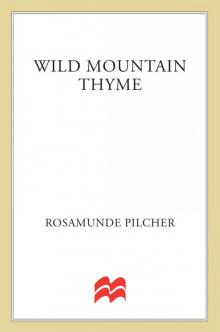 Wild Mountain Thyme
Wild Mountain Thyme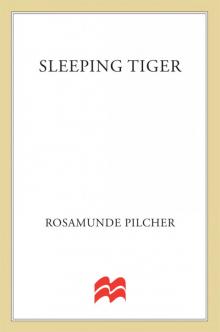 Sleeping Tiger
Sleeping Tiger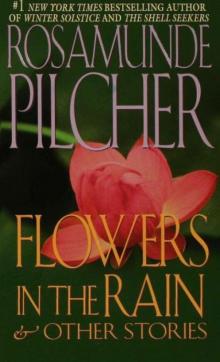 Flowers in the Rain & Other Stories
Flowers in the Rain & Other Stories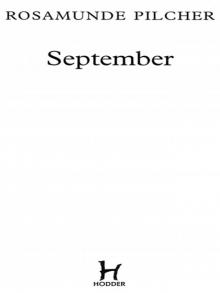 September
September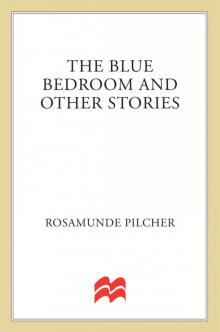 The Blue Bedroom: & Other Stories
The Blue Bedroom: & Other Stories The Carousel
The Carousel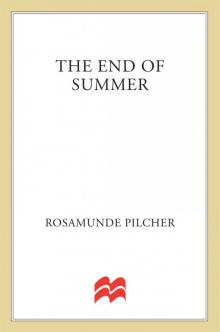 The End of Summer
The End of Summer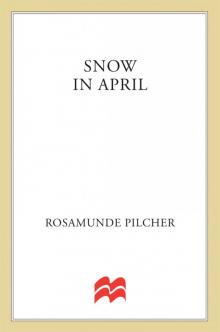 Snow in April
Snow in April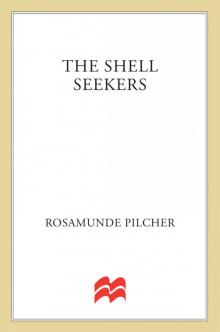 The Shell Seekers
The Shell Seekers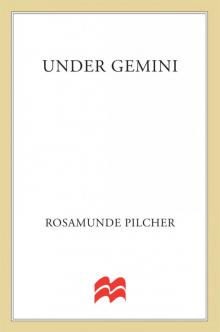 Under Gemini
Under Gemini The Empty House
The Empty House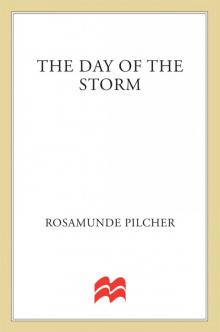 The Day of the Storm
The Day of the Storm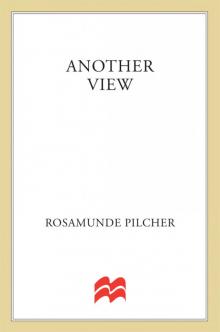 Another View
Another View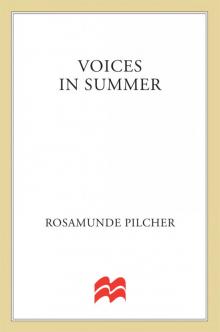 Voices in the Summer
Voices in the Summer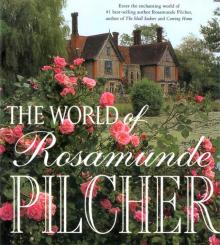 The World of Rosamunde Pilcher
The World of Rosamunde Pilcher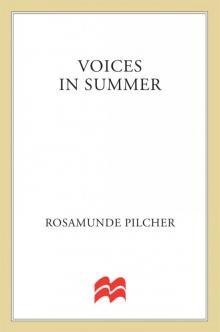 Voices In Summer
Voices In Summer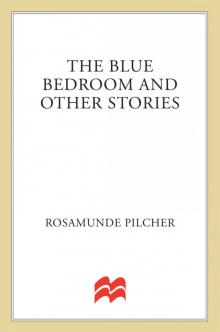 Blue Bedroom and Other Stories
Blue Bedroom and Other Stories